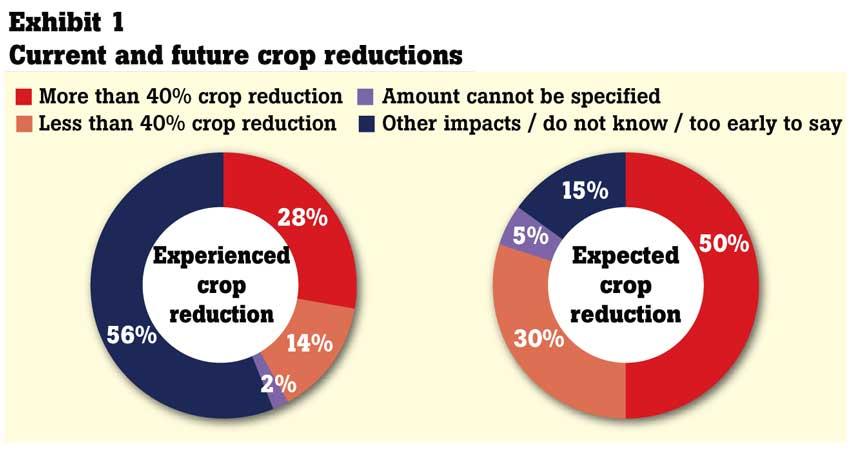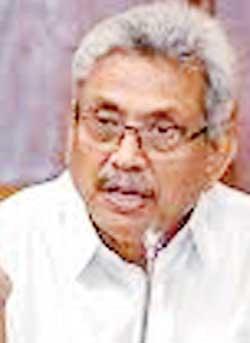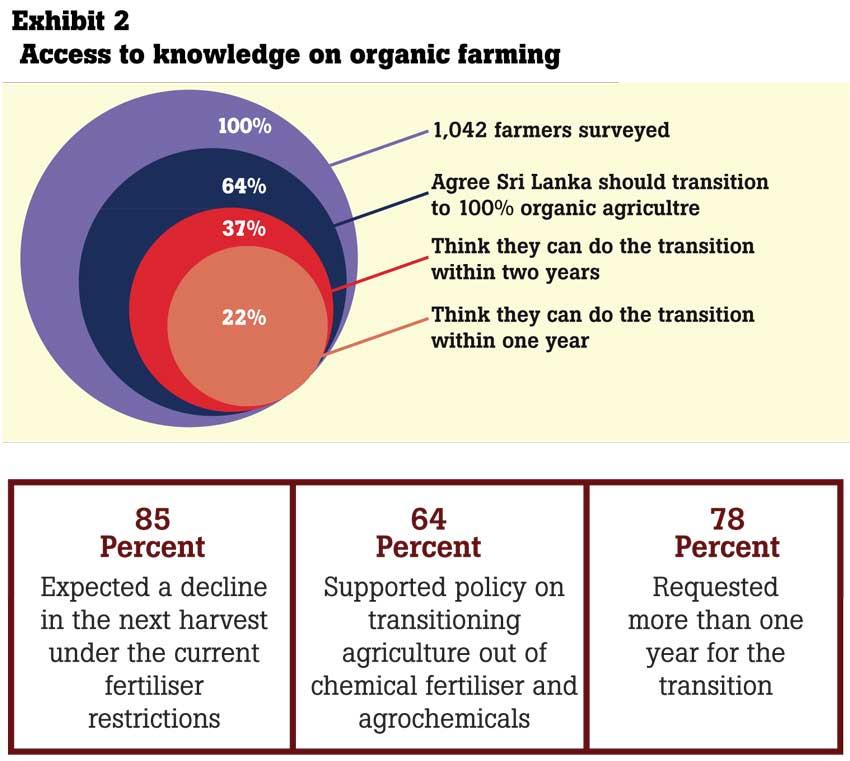
 On April 22, 2021, President Gotabaya Rajapaksa declared a ban on the importation of chemical fertiliser to make Sri Lanka “the to start with nation in the globe to be totally free of chemical fertiliser”. The final decision was handed into legislation by a gazette revealed by the Finance Ministry on Could 06, 2021.
On April 22, 2021, President Gotabaya Rajapaksa declared a ban on the importation of chemical fertiliser to make Sri Lanka “the to start with nation in the globe to be totally free of chemical fertiliser”. The final decision was handed into legislation by a gazette revealed by the Finance Ministry on Could 06, 2021.
Verité Study conducted an all-island cellphone survey amid farmers from July 01 to 10, 2021, to find out the views of the farmers and the effect of the selection. The survey protected all 9 provinces and incorporated 1,042 farmers cultivating all important crops: paddy, fruits, vegetables, coconut, tea, small export crops (spices) and cereal.

The survey had 4 main conclusions that ended up vital for the determination-creating of the governing administration: (1) farmers had been broadly supportive of the govt coverage to changeover to organic and natural fertiliser having said that, farmers: (2) anticipated enormous reduction in harvest below current limitations, (3) lacked know-how as perfectly as resources of know-how to changeover to organic and natural farming and (4) wanted extra time to make the changeover.
The study findings prompt, in general, that Sri Lankan policymakers really should endeavor to avert a plan-induced scarcity in agriculture output and foods creation by considering the pragmatic sights of the farmers, most of whom are supportive of the government’s chemical fertiliser-free agriculture plan. Failing to do so will further more irritate the pains triggered by the pandemic.
Context of new fertiliser coverage
The dependence of farmers on chemical fertiliser was high (in accordance to the survey responses). Around 90 p.c of the farmers surveyed use chemical fertiliser. For a bulk of them (76 %), chemical fertiliser accounts for extra than 50 % of their total fertiliser usage. Paddy farmers, who provide the state with rice, its staple food stuff, are the optimum consumers of chemical fertiliser (94 per cent).
Wide assist for natural fertiliser coverage
At the time the survey was performed (i.e., two months following the ban was released), the aid among farmers for the government coverage was significant. Virtually two-thirds agreed that the nation must transition into organic and natural agriculture: 64 per cent of the farmers surveyed answered “yes” to the question “Do you agree that Sri Lanka must transition to 100 p.c natural and organic agriculture?”

The vast majority of farmers assume future harvest to reduce nearly by fifty percent
Even at the time the study was carried out, the ban experienced developed a shortage of chemical fertiliser in the industry, denying the farmers the essential quantity of fertiliser. Sixty-three percent of farmers surveyed explained “yes” when asked in July 2021, whether they have been compelled to cut down the amount of chemical fertiliser employed in the latest/most-latest cultivation cycle in comparison to typical use. Nearly 50 percent of these surveyed (44 %) mentioned that the current overall reductions created in chemical fertiliser and/or agrochemicals negatively influenced their most-the latest harvest.
When requested what they consider would be the foreseeable future impact on harvest/quantity made, if they could not use chemical fertiliser or agrochemicals, an frustrating greater part (85 percent) said that they expected a reduction in their upcoming harvest. 50 % of the farmers surveyed expected the harvest to lower by additional than 40 p.c (Exhibit 1).
Absence of knowledge and guidance
The survey found that the farmers lacked the required know-how and direction on chemical fertiliser-absolutely free agriculture. Though 35 per cent of the farmers believed they experienced satisfactory awareness to cultivate without having chemical fertiliser, when that team was probed further, only 23 p.c said they ended up also informed of the suitable natural and organic options for their crops and only 20 per cent claimed they also knew how to appropriately use the suited natural fertiliser (Show 2).
When questioned irrespective of whether they have been given guidance/guidelines on how to engage in agriculture with no utilizing chemical fertiliser or agrochemicals, approximately two-thirds of the farmers (63 percent) claimed “no”. About 50 % of the farmers stated “no” when questioned regardless of whether they know individuals with know-how and encounter who can advise them on how to cultivate with no making use of any chemical fertiliser or agrochemicals.
Farmers require much more time and govt. aid to transition
Practically two-thirds of the farmers agreed that Sri Lanka should really transition to 100 % organic and natural agriculture. However, when requested how significantly time they will need to successfully transition to 100 per cent organic and natural agriculture, 78 % of individuals who supported the coverage stated they will need more than a calendar year to transition.
In reaction to the dilemma “what advise/ideas will you give to the governing administration on transitioning to organic and natural agriculture correctly?”, the pursuing a few requests topped the listing: 1) more time to make the changeover, 2) necessary steering/guidelines and 3) standardised natural and organic options.
Conclusion
The voice of the farmers captured in this study exposed that a majority of them had been not inquiring for a transform in coverage but asking for an adoption of a extra pragmatic solution in the way the coverage was becoming executed.
The survey findings were being an early warning sent to the government by farmers of a doable food scarcity. Sri Lanka would do well to avert a policy-induced food lack by having observe of these early warnings and the pragmatic requests by the farmers for much more time and help in utilizing the changeover toward organic fertiliser.








